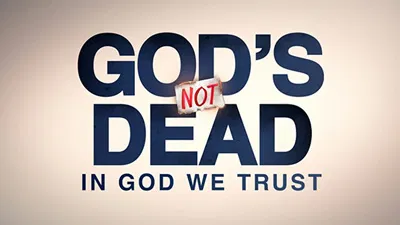
God’s Not Dead 3: A Light in Darkness Movie Review
[Spoiler Alert: Though this review contains few, if any, spoilers, those who wish to have none may want to read this review after seeing the movie.]
Pastor Dave Hill and other previous cast members reprised their roles in this third installment of the God’s Not Dead movie series. Pastor Dave, himself this time, faces discrimination at the hands of a university board bent on removing Dave’s church, primarily for its Christian presence, from the campus. Caught up in tragic events that enflame both Dave, who becomes the publicized Christian representative in the film, and the community, we see a somewhat caricatured secular opposition. The Christians portrayed in the film, however, seem genuine and thus flawed, which was refreshing and realistic. Some are struggling with their faith, some are hotheads, and some are arguably overly dependent upon emotions or signs.
The Christians portrayed in the film, however, seem genuine and thus flawed, which was refreshing and realistic.
This family-friendly movie was a pleasure to watch with my family and friends. There weren’t any cringe-worthy moments1 or anything that I needed to explain away once we were on our way home. Instead, our car was filled with lively God-honoring conversation about how to live our Christian lives in the face of adversity and waning civil rights, and how to show love to a jaded culture that has a caricatured view of Christianity because of the failings of its representatives—us. Yet this movie wasn’t overly apologetic about that. Christians were presented as humans, and, in this case, when they were at fault, they asked forgiveness: a wonderful example.
The movie is a welcome addition to the series, perhaps the best. As a moviegoer, I thought the script, acting, visuals, and overall story were compelling. As a Christian, I felt camaraderie with people both in the theater and on the screen, as did my other moviegoers. Naturally there was almost no objectionable language2 or innuendos, and the mild bit of violence seemed to be the only cause for the PG rating.
What Is Truth?
Perhaps the best line of the movie was this: “Truth is a person and that person is Jesus.” Several Bible references were used (e.g., Psalm 30:5; Luke 12:48) and a recurring theme was “God is good all the time, and all the time God is good.” The young men and women that accompanied me commented on how the issues raised in the movie really reflected our times. They also felt that the way the Christians in the movie dealt with their difficulties was helpful to them and would be uplifting and healing for those who may be hurting or struggling with their faith or with past negative experience with Christians or the church.
There was a brief reference to science and evolution being the cause for how some view the church negatively, such that it wasn’t relevant anymore—that we’d “evolved” beyond the need for the church. Some better answers could have been given against those charges, but Pastor Dave did rebut this and some other charges against Christianity adequately, though he missed an opportunity to share the gospel and greater purpose of saving souls for eternity. When needing to “filibuster,”3 Dave also began publicly reading his Bible beginning in Genesis 1.
Sadly, however, Bible-reading seemed to be the thing most missing in the film, particularly in the scenes where the Christians are struggling. Prayer was common, but there seemed to be an inordinate emphasis on asking God to speak in a way that did not come through his Word. I would argue that the Bible with prayer is the way to hear God speak to us most of the time.4 This thinking would have alleviated another common theme early in the movie of “no answer” from God. God doesn’t need to “speak” to us or show us visions. What he’s given us in his Word is more than enough for every situation that this world can throw at us (Romans 15:4). And when we read, we pray for the Holy Spirit to enlighten his words that are already there and have been for centuries.
Final Lessons
This “lost” nature of some of the characters in the movie did bring about an important point. As one wise discussion in the movie relayed it, uncertainty doesn’t mean that God has left us or that he’s not speaking. It means we need to seek out the truth. The movie gave the biblical example of John the Baptist searching out about Jesus to confirm his faith (Matthew 11). Ultimately the movie became about sacrifice, showing forgiveness and love to a culture desperately in need of both. As Christians, we are called to this, and this is often a way to soften hearts and open the door to the most important thing we need to share: the hope and love of our Savior Jesus Christ, who can offer the only forgiveness, hope, and love that is effectual for eternal life with him.
Footnotes
- One colleague commented that he cringed a little bit when Jesus was referred to as “the ultimate social justice warrior.” The actor who said that was making a larger point about Jesus giving “undue” help and attention to the poor, downtrodden, sinners, and even women, which was somewhat “radical” at that time. We would argue that more should have been said at that point of Jesus’ status as Son of God, Savior, and Redeemer, among many other more-glorifying statuses.
- One Christian actor, surprisingly, was expressing dismay and used God’s name inappropriately, though there was no cursing. In one other instance, there was a reference to a crude gesture. While I tried to be careful to listen for any and all objectionable content, I will acknowledge that I may have missed some others.
- I’m being intentionally vague so as not to provide spoilers.
- One character, at his lowest point, even throws his Bible across the table in a moment of frustration rather than reading it.
Recommended Resources

Answers in Genesis is an apologetics ministry, dedicated to helping Christians defend their faith and proclaim the good news of Jesus Christ.
- Customer Service 800.778.3390
- Available Monday–Friday | 9 AM–5 PM ET
- © 2026 Answers in Genesis




